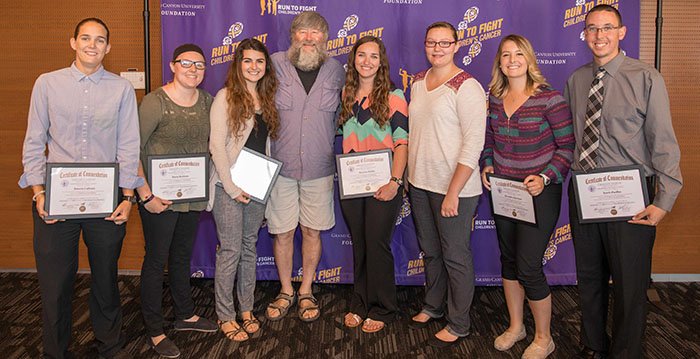
Story by Rick Vacek
Photos by Slaven Gujic
GCU News Bureau
Perry Harris estimates that he did 800 jumps as a professional skydiver and had to deploy his reserve parachute a half-dozen times.
He loves to hike for weeks, by himself, on remote trails and has survived two close encounters with bears.
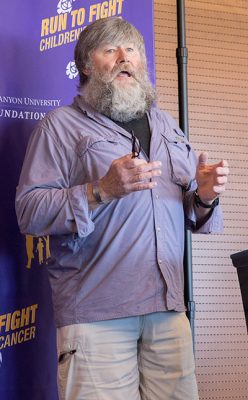
But the only good fortune on Harris’ mind March 11 was how much he was enjoying his time with his family on the Grand Canyon University campus during the Run to Fight Children’s Cancer.
Then came the luckiest moment of his life.
The 59-year-old Peoria resident wasn’t alarmed by the burning sensation in his lungs as he and his 10-year-old niece strolled around campus while his brother and sister took part in the GCU Foundation event. He’d felt that discomfort for the last year, ever since being slowed by a severe cold.
But soon after they passed the finish line, in front of GCU Arena with thousands of people milling about, Harris suddenly felt dizzy and collapsed, face first, on the concrete. The left anterior descending valve to his heart, aka “The Widow Maker,” was blocked. If he didn’t get help fast, it would be too late.
And here’s where the story goes to a place that no rabbit’s foot dares to tread.
Standing nearby was Dr. Daniel Bishop, an attending physician at St. Joseph Medical Center in Phoenix. He was buying shaved ice treats for his family and had been on the GCU campus only once before — to get his race packet the previous day.
Steps away was the main first-aid station of GCU’s Sports Medicine Club. They were there because one of their members, Daria Bickham, thought it would be a good idea to partner with the race as a way of serving the community and also learning more about their future craft.
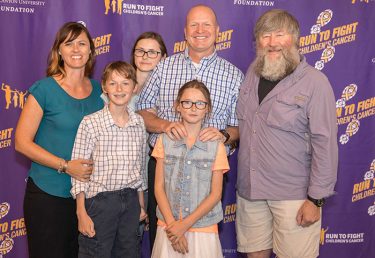
Walking back toward that station was Emily Dunning, a teacher and certified athletic trainer at Liberty High School in Peoria and a former GCU intern who now is a clinical preceptor for students from the University. She had just come back from another aid station on the race course.
And members of the GCU Police Department were on the scene, too, to call 911 and quickly form a perimeter around Harris, giving the medical personnel room to do their jobs.
“If you had the opportunity to plan your cardiac arrest,” Bishop said Wednesday during a recognition ceremony at GCU for the first responders, “you should do it the way Mr. Harris did it.”
Said Harris, who thanked them profusely during his lively talk to the group, “I’m a little reluctant to throw the word ‘miracle’ around, but I could see taking license to use that word.”
Believe it or not, though, it gets even more remarkable.
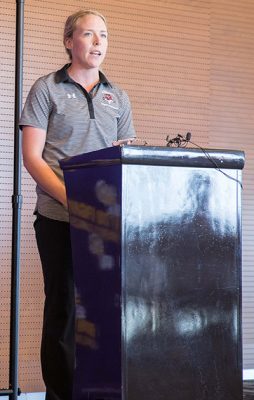
In 12 years as a physician, Bishop had never encountered an emergency away from the hospital. Despite that, he immediately knew what he must do — start cardiopulmonary resuscitation (CPR) and, if that doesn’t work, use a defibrillator.
“It just clicks in,” he said. “One of the wonderful things about the training we get is that we’ve done it enough that we realize, ‘This is what’s going on. This is what has to happen.’ It gets in your brain. You don’t even have to think about it. It’s like driving to work.”
The Sports Medicine Club members knew right away they had to go into overdrive, too.
“We had to act and do what we learned in class,” said the club’s vice president, Cecelia Chang. “We learned to always be prepared.”
Same went for Dunning, who had never encountered anything worse than a dislocated knee in her three years at Liberty. She estimates that she has called 911 “maybe four times” for serious injuries to one of her athletes, but never for anything of this magnitude.
The first rule she tells students is to never come running up to her unless it’s an emergency.
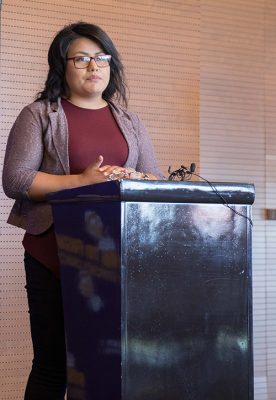
They were running. She knew she had to hustle, too.
“It’s all the stuff you prepare for but rarely ever see,” she said.
And that would be the end of a nice little happily-ever-after story, except that there’s still more.
Bishop did aggressive CPR on Harris. No response. But Dr. David Mesman, the Sports Medicine Club’s adviser, retrieved the automated external defibrillator (AED) in the Arena, and that worked. Harris sat up — he doesn’t remember any of this — and acted as if nothing had ever happened. He was on his way to the hospital within 10 minutes and was out two days later, a stent having been implanted to open the diseased heart valve.
“Isn’t it great to be alive?” he told the group Wednesday. “What a great thing to say and actually mean it.”
Bishop and Harris both spoke passionately about the importance of having more defibrillators available in any populated area, along with people trained to use them.
Harris said he even Googled “defibrillator near me” recently and saw four come up, but he’d like to see it be many more than that. He knows all too well what would have happened that day if there hadn’t been the perfect confluence of location, people and circumstances.
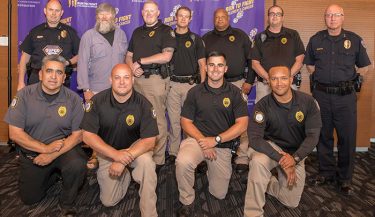
“When I think about the activities I did the hour before, the day before, the week before, the month before, I could have dropped dead at any moment along the way,” he said.
For years, he thought nothing of his daredevil lifestyle as a member of a U.S. Army skydiving team, the Golden Knights. It was just something he did.
“For all intents and purposes, when you jump out of an airplane you’re dead until you do something,” he said. “And then if your main chute doesn’t work and you have to use your reserve, you have to do the next thing right, or you’ll be dead. I did the right thing at the right time when I had to.”
Away from the Army, Harris was a carpenter by trade, and in 2012 he decided to retire and move to Arizona from his native Lincoln, Ill. Befitting his mountain man beard, he also decided it was time to fulfill his dream of hiking the Pacific Crest Trail, which runs along the Sierra Nevada and Cascade mountain ranges from Mexico through California, Oregon and Washington and all the way into Canada. He kept doing it once a year, despite his fears of what was out there with him.
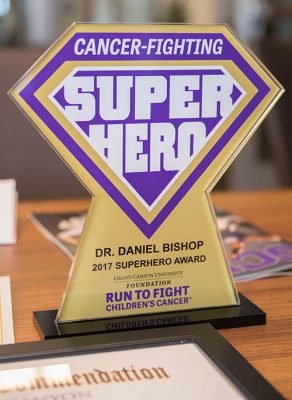
“My imagination got the best of me about being out where bears and mountain lions are,” he said. “The way I came to terms with that was I said, ‘Well, I’ve already been tested and had to use my reserve parachute, and I’m here to tell about it. So I think, if I have to, I’ll do the right thing if I’m attacked by a bear or a mountain lion.’”
He never saw a mountain lion — the old adage is that they see you but you never see them. Bears were another story. They crossed his path a half-dozen times, and two of them wanted a closer look.
The first time, he said, he just yelled until it ran away. The second time, he started out yelling but then actually sang to it. That worked, too.
“If I saw a bear a third time, I wasn’t going to do anything and see if I could enjoy its company a little bit,” he said.
Spoken like a guy who survived a “Widow Maker” heart attack.
Harris hasn’t done any physical activity since March 11 because his torso has needed time to heal from the CPR, but there is one thing he did, quite appropriately under the circumstances: He bought a lottery ticket.
“It was kind of a joke,” he said. “But then I said, ‘You know what? I already won the lottery.’”
That’s what goes through your mind when no amount of money could make you feel any luckier — thanks to a group of people who left nothing to chance.
● GCU Sports Medicine Club members honored: Emily Bates, Daria Bickham, Braedyn Boldin, Alexandra Burcham, Janeria Calhoun, Shae Turner, Travis Pasillas (secretary), Cecelia Chang (vice president), Dr. David Mesman (adviser)
● Run to Fight Children's Cancer Community Champions honored: Emily Dunning, Dr. Daniel Bishop
● Police honored: Kenneth Laird (Chief), supervisors Raef Bristle and BJ Sidebottom, officers Mike Fucci, Artway Robinson, Steven Himes, Trevor Aker, Erika Morrissette, Arnold Washington, Anthony Gashwazra, Ruben Napoleon.
● Here's the report from 3TV.
Contact Rick Vacek at (602) 639-8203 or [email protected].



































































